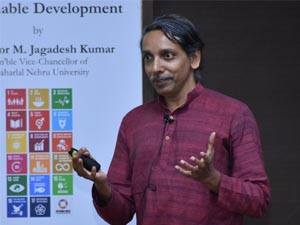The Vivekananda International Foundation (VIF), New Delhi, hosted its monthly event, Vimarsha, On 8 August 2018, the topic being, ‘Technology for Sustainable Development’ and talk delivered by Professor M. Jagadesh Kumar, Hon'ble Vice-Chancellor of Jawaharlal Nehru University. Professor M. Jagadesh Kumar was appointed as the Vice Chancellor of the prestigious university in January 2016 and continues to pursue his deep-rooted passion of academia fervently. He also takes classes on weekly basis at IIT-Delhi. His area of research is nano-electronic devices, nano-skilled device modelling and simulation, and innovative device design of power to name a few. So far as part of his accomplishments, six patent applications have been registered in his name.
Dr. Arvind Gupta, Director, Vivekananda International Foundation, highlighted in his address that the subject chosen for the event requires deeper understanding of the connection between technology and sustainable development. He noted, “The progress of civilisation has always been underpinned by advanced technology. As mankind and civilisation has grown, technology has become an integral part of that evolution. And in today’s age, technology is the key driver of globalisation. But it has two sides to it. On one hand, it has helped the mankind to improve its material well-being and on the other it has created instruments of destruction likes the weapons of mass destruction. Technology has major impact on society and social behaviour, both positive as well as negative. In India, technology is being used to improve governance and well-being of the people. In fact, India needs more technology to solve its problems. However, questions will always arise, especially around artificial intelligence, big data, 3-D printing, jobs and privacy. Such issues are being debated universally. As President Putin said, ‘One who rules data, rules the entire world’, which is a play on the phrase of the Mackinder who said that one who rules Eurasia, will rule the world. But now data has become the paramount necessity.”
Dr. Gupta observed that the importance of data cannot be overstated and the emergence of large data driven platforms required a paradigm shift on how we approach development, particularly sustainable development. In his views, e-commerce platforms have an impact on spectrums ranging from production to consumption. The entire value chain is driven by data and looming platforms are not only creating jobs but controlling data as well. Other dimension of technology impacts environment as well. The emergence of climate change as existential threat is directly related to the use of fossil fuels based technology. Overall, environmental degradation and loss of biodiversity as a result of modern methods of production based on latest technologies is an issue of concern. So, the major question is if technology can make development sustainable. This is followed by discussion on access to affordability.
Interestingly, Professor M. Jagadesh Kumar began his presentation by drawing comparisons between the minds of a monkey and a human being that allows these species to use their brain in different manners. He also highlighted the achievement of renowned scientist, Robert F. Carl Jr., who won Nobel Prize for inventing soccer ball shaped carbon molecule called fullerene. As per Carl, people who painted in the Ajanta Caves used nanoparticles. He answered the question about know-how of technology as, “When we study science we know nature is being studied by us and also the principles that control nature. But when we use scientific knowledge for practical applications, it is then that we are developing technology. In short, we are developing tools to make our lives simpler. Nowadays technology has become all-pervasive but it is also influencing our lifestyle. For instance, children used to handling laptops may not be able to use pen/pencils effectively as a result of poor motor skills.”
According to Professor Kumar, our lives have gone under tremendous change with the absorption of technology. Nano technology has rendered it possible to create nano wires and nano particles. Due to the interesting properties of technology, it is very much easier to mould it into various usages as per our suitability. He explained how structural problem in the creation of systems for urban-oriented lifestyles has led to spread of toxic waste in the environment. Such concerns lead us to ponder upon the factor of sustainability. Contrary to widespread beliefs, development means meeting the needs of the present without compromising the ability of the future generation. The three pillars of sustainable development are environment, economy and society. Environment deals with the biodiversity, the materials, and bio-physical interactions and the energy. Another important thing to take in notice is that fossil fuels cover about 80 percent of our energy needs leaving less room for renewable energy.
In his concluding section on how we can become sustainable, the speaker explained steps such as values (internal and external), responsibility and strategies (adaptive strategies and not the fixed ones) in order to build a sustainable society. This will take us from mindless competition to relational care. It will also make us indulge in cultural diversity than identity politics. Further it will help us to create spiritual development than material security - as Bhagwad Gita reads, “In all actions, consider the common good”.




Post new comment